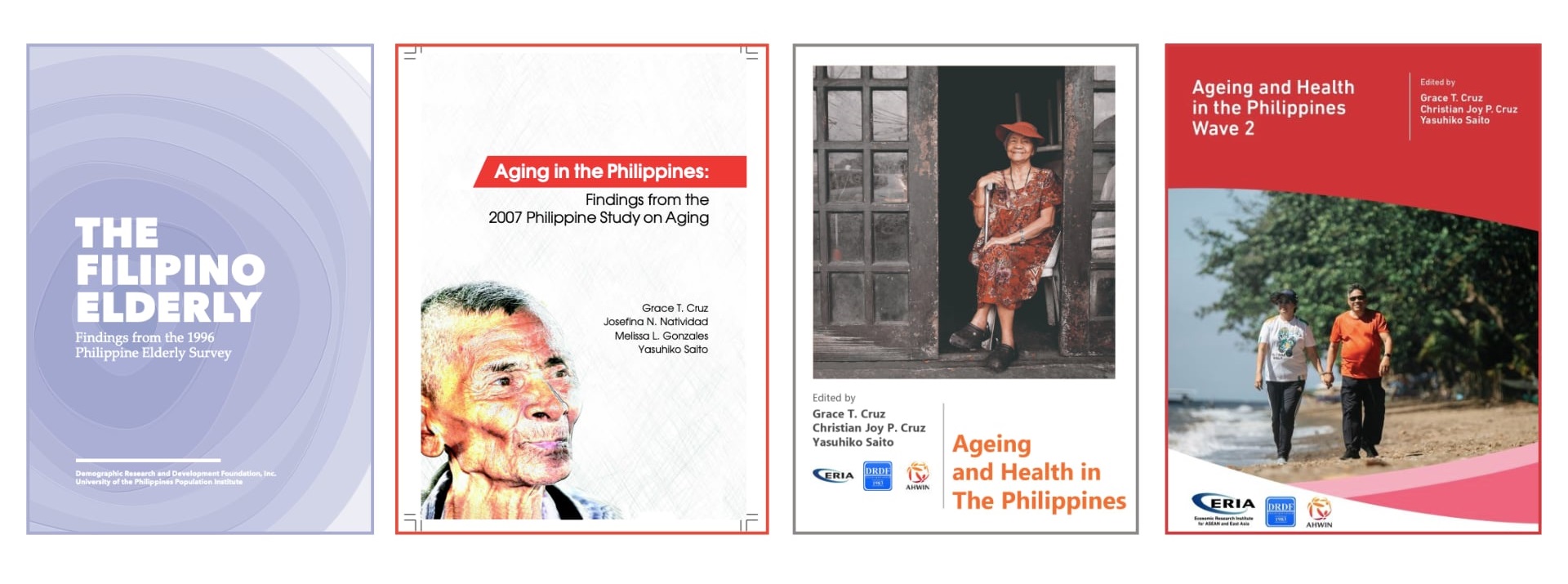UPPI-DRDF at the forefront of Aging Research in the Philippines

The Philippines is transitioning to an aging society, making research on population aging more critical than ever to inform policies and programs that promote the health and well-being of older Filipinos.
As early as 1984, at a time when population aging was not yet considered a pressing issue, Dr. Lita J. Domingo of UPPI was among the first to bring aging into focus as an area of demographic research in the country. Since then, the University of the Philippines Population Institute (UPPI) and the Demographic Research and Development Foundation, Inc. (DRDF) have been spearheading nationwide studies on aging, such as the following:
Philippine Elderly Survey (1996)
The 1996 Philippine Elderly Survey (PES) was a part of the multinational study of aging in Asia, which also involved Singapore, Thailand, and Taiwan. The University of Michigan Population Studies Center oversaw the study, which was funded by the National Institute on Aging (NIA) of the U.S. National Institutes of Health (NIH). The late UPPI Professors Dr. Lita J. Domingo, Dr. Aurora E. Perez, and Dr. Josefina V. Cabigon spearheaded this landmark study in the country. The study examined the labor force participation, migration patterns, living arrangements, and health risk behaviors of Filipino older persons, among other factors.
Philippine Study on Aging (2007)
In 2007, UPPI conducted the Philippine Study on Aging, funded by the Nihon University Population Research Institute of Japan. The study introduced methodological innovations, including the collection of anthropometric measurements (blood pressure, grip strength, body mass index, and number of teeth), the use of vignettes, and facial photographs of respondents, to provide deeper insights into the issues and concerns of older people.
Longitudinal Study of Ageing and Health in the Philippines |Wave 1 (2018) and Wave 2 (2023)
The Longitudinal Study of Ageing and Health in the Philippines (LSAHP) is the country’s first nationally representative panel study of Filipinos aged 60 and older. It is designed to (1) investigate the health status and well-being of older Filipinos and the factors influencing these
outcomes, and (2) analyze the factors associated with health transitions. Aside from older persons, the survey also collects information from their adult children and primary or potential caregivers. The study is funded by the Economic Research Institute for ASEAN and East Asia (ERIA) and conducted by the Demographic Research and Development Foundation, Inc. (DRDF). LSAHP was also the first-ever aging research study in the Philippines to utilize the Short Portable Mental Status Questionnaire (SPMSQ), a cognitive assessment tool used to evaluate cognitive functioning in older persons.
The first wave of LSAHP was conducted in 2018, achieving a 94% response rate, with 5,985 older persons interviewed. In 2025, the report for the second wave was released, expanding its focus to include nutrition, updated measures of well-being, geospatial indicators, adult mortality, and COVID-19 experiences. It covered 4,011 surviving respondents and 1,514 informants of deceased respondents, yielding a 93% response rate.
The UPPI, together with DRDF, is committed to serving as a central repository of knowledge on critical population issues, particularly aging. It is hoped that these foundational research studies will continue to inform proactive policies and programs that older persons and their families rightfully deserve.
To know more about these studies, scan the QR code below:

Share
